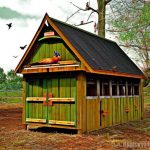When keeping chickens, it is essential to understand their requirements to create a safe and suitable environment. Chickens are natural foragers that enjoy roaming and scratching for food, necessitating adequate space for these activities. They are also vulnerable to various predators, including foxes, raccoons, and birds of prey, making a secure enclosure crucial for their protection.
Understanding chicken behavior and needs is fundamental in determining the appropriate type and size of fencing. Chickens require shelter from the elements, and their enclosure should provide easy access to food and water. A secure and comfortable environment not only ensures their safety but also contributes to their overall health and productivity.
By comprehending the specific needs of chickens, owners can make informed decisions regarding the most suitable fencing options for their flock.
Table of Contents
- 1 Choosing the Right Height for Your Chicken Fence
- 2 Factors to Consider When Determining Fence Height
- 3 Benefits of a Properly Sized Chicken Fence
- 4 Common Mistakes to Avoid When Installing a Chicken Fence
- 5 Alternatives to Traditional Fencing for Chicken Enclosures
- 6 Maintenance and Upkeep of Your Chicken Fence
- 7 FAQs
- 7.1 What height of fence is recommended to keep chickens in?
- 7.2 Why is a 6-foot fence recommended for keeping chickens in?
- 7.3 Are there any other factors to consider when choosing a fence height for chickens?
- 7.4 What are some options for fencing materials to keep chickens in?
- 7.5 Are there any additional measures that can be taken to secure a chicken enclosure?
Key Takeaways
- Understanding the needs of your chickens is crucial for choosing the right fence height
- The right height for your chicken fence depends on various factors such as predator threats and chicken breeds
- Factors to consider when determining fence height include predator types, chicken behavior, and available space
- A properly sized chicken fence provides protection from predators and ensures the safety of your chickens
- Common mistakes to avoid when installing a chicken fence include choosing the wrong height and using low-quality materials
Choosing the Right Height for Your Chicken Fence
Primary Purpose: Safety from Predators
When it comes to choosing the right height for your chicken fence, there are several factors to consider. The primary purpose of a chicken fence is to keep your flock safe from predators, so the height of the fence is crucial in achieving this goal. A good rule of thumb is to make sure the fence is at least 6 feet tall to prevent predators from jumping or climbing over it.
Factors to Consider
However, the specific height of the fence will depend on the size and breed of your chickens, as well as the types of predators in your area. In addition to keeping predators out, the height of the fence should also take into account the need for your chickens to have enough space to move around and stretch their wings.
Striking a Balance
A taller fence can provide a sense of security for your chickens and give them more room to roam and explore. It’s important to strike a balance between security and freedom of movement when choosing the right height for your chicken fence.
Factors to Consider When Determining Fence Height

When determining the height of your chicken fence, there are several factors to consider. First and foremost, you’ll need to assess the types of predators in your area and their capabilities for jumping or climbing. For example, if you have a problem with foxes, you’ll need a taller fence than if you’re dealing with smaller predators like raccoons or weasels.
It’s important to research the specific predators in your area and take their behaviors into account when determining the height of your fence. Another factor to consider is the size and breed of your chickens. Larger breeds may require a taller fence to prevent them from flying or jumping over it, while smaller breeds may be content with a shorter fence.
Additionally, if you plan on adding new chickens to your flock in the future, it’s important to consider their potential size and behavior when determining the height of your fence. By taking these factors into consideration, you can ensure that your chicken fence is the right height to keep your flock safe and secure.
Benefits of a Properly Sized Chicken Fence
A properly sized chicken fence offers a range of benefits for both you and your flock. First and foremost, it provides essential protection from predators, keeping your chickens safe and secure. This can give you peace of mind knowing that your flock is protected from potential threats.
Additionally, a properly sized chicken fence can help prevent your chickens from wandering into areas where they shouldn’t be, such as gardens or neighboring properties. Furthermore, a well-designed chicken fence can contribute to the overall health and well-being of your flock by providing them with a safe and comfortable environment. It can also help prevent conflicts with neighbors or local wildlife by keeping your chickens contained within their designated area.
By investing in a properly sized chicken fence, you can create a secure and harmonious environment for both your flock and your community.
Common Mistakes to Avoid When Installing a Chicken Fence
When installing a chicken fence, there are several common mistakes that should be avoided in order to ensure its effectiveness. One common mistake is underestimating the height needed to keep out predators. It’s important to thoroughly research the types of predators in your area and plan accordingly when determining the height of your fence.
Another mistake is using materials that are not durable or secure enough to withstand potential threats from predators. It’s essential to invest in high-quality materials that will provide long-lasting protection for your flock. Additionally, failing to properly secure the bottom of the fence can create an opportunity for predators to dig underneath and gain access to your chickens.
It’s important to bury the bottom of the fence or use an apron or wire mesh to prevent digging. Finally, overlooking regular maintenance and upkeep of the fence can lead to potential vulnerabilities over time. It’s important to regularly inspect and maintain your chicken fence to ensure that it continues to provide adequate protection for your flock.
Alternatives to Traditional Fencing for Chicken Enclosures

Electric Fencing: A Flexible and Cost-Effective Option
While traditional fencing is a popular choice for chicken enclosures, electric fencing is an alternative that can provide effective protection against predators while allowing for more flexibility in terms of layout and design. Electric fencing can be easily customized to fit the specific needs of your flock and can be a cost-effective option for larger areas.
Natural Barriers: Aesthetic and Functional
Another alternative is using natural barriers such as hedges or shrubs to create a living fence around your chicken enclosure. This can provide both protection and aesthetic appeal while allowing your chickens to benefit from natural foraging opportunities.
Portable Fencing and Netting: A Flexible Solution
Additionally, using portable fencing or netting can provide a flexible solution for temporary enclosures or rotational grazing systems. This option allows you to easily move or adjust the fencing to suit the changing needs of your flock.
Exploring Alternative Options
By exploring alternative options to traditional fencing, you can find a solution that best suits the needs of your flock and your property.
Maintenance and Upkeep of Your Chicken Fence
Once you have installed a chicken fence, it’s important to prioritize regular maintenance and upkeep in order to ensure its long-term effectiveness. Regular inspections should be conducted to check for any signs of wear or damage that could compromise the security of the enclosure. This includes checking for loose or broken wires, damaged posts, or areas where predators may have attempted to breach the fence.
In addition to regular inspections, it’s important to keep vegetation around the fence trimmed back to prevent it from providing cover for predators or creating opportunities for them to climb over or dig under the fence. Regularly clearing debris such as fallen branches or leaves from around the fence can also help maintain its integrity. Finally, it’s important to address any repairs or maintenance issues promptly in order to prevent potential vulnerabilities from developing over time.
In conclusion, understanding the needs of your chickens is essential for providing them with a safe and comfortable environment. When choosing the right height for your chicken fence, it’s important to consider factors such as predator behavior, chicken breed, and future expansion plans. A properly sized chicken fence offers numerous benefits for both you and your flock, including protection from predators and a secure environment for foraging and roaming.
By avoiding common mistakes during installation and exploring alternative fencing options, you can create a secure and harmonious environment for your chickens. Finally, prioritizing regular maintenance and upkeep will ensure that your chicken fence continues to provide long-term protection for your flock.
If you’re wondering how high of a fence to keep your chickens in, you may also be interested in learning about the ideal size for a chicken coop. Poultry Wizard has a helpful article on how big a coop needs to be for a chicken, which can provide valuable insights into creating a safe and comfortable living space for your feathered friends.
FAQs
What height of fence is recommended to keep chickens in?
The recommended height for a fence to keep chickens in is at least 6 feet tall. This height will prevent most chicken breeds from flying over the fence.
Why is a 6-foot fence recommended for keeping chickens in?
A 6-foot fence is recommended to keep chickens in because it is tall enough to prevent most chicken breeds from flying over it. This helps to keep the chickens safe and contained within their designated area.
Are there any other factors to consider when choosing a fence height for chickens?
In addition to the height of the fence, it’s important to consider the breed of chickens being kept, as some breeds are better flyers than others. Additionally, the presence of predators in the area should also be taken into account when determining the appropriate fence height.
What are some options for fencing materials to keep chickens in?
Common fencing materials for keeping chickens in include wire mesh, chicken wire, and hardware cloth. These materials are durable and can be used to construct a secure enclosure for chickens.
Are there any additional measures that can be taken to secure a chicken enclosure?
In addition to a tall fence, other measures to secure a chicken enclosure include burying the fence underground to prevent predators from digging underneath, and adding a cover or roof to the enclosure to prevent aerial predators from entering. Regular inspections and maintenance of the fence are also important to ensure its effectiveness in keeping chickens in.
Meet Walter, the feathered-friend fanatic of Florida! Nestled in the sunshine state, Walter struts through life with his feathered companions, clucking his way to happiness. With a coop that’s fancier than a five-star hotel, he’s the Don Juan of the chicken world. When he’s not teaching his hens to do the cha-cha, you’ll find him in a heated debate with his prized rooster, Sir Clucks-a-Lot. Walter’s poultry passion is no yolk; he’s the sunny-side-up guy you never knew you needed in your flock of friends!







